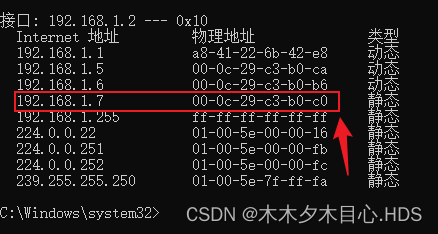DPDK程序结合网络助手接收数据
网络调试工具:https://download.csdn.net/download/hdsHDS6/88390999?spm=1001.2014.3001.5503
DPDK代码:
#include
#include
#include
#include
#include
#include
#include
#include
#include
#include
#include
#include
#include
#define NB_MBUF 512
#define MAX_PKT_BURST 32
#define SELF_PROTO_TYPE 0x0888
static struct rte_eth_conf port_conf = {
.rxmode = {
.split_hdr_size = 0
}
};
// cat /proc/interrupts
void init_port(struct rte_mempool *mbuf_pool){
uint16_t nb_ports = 0;
int ret = 0;
int portid = 0;
struct rte_eth_dev_info dev_info;
struct rte_ether_addr addr;
const int num_rx_queues = 1;
const int num_tx_queues = 0;
nb_ports = rte_eth_dev_count_avail();
if(nb_ports == 0){
rte_exit(EXIT_FAILURE, "No support eth found\n");
}
for(portid = 0; portid < nb_ports; portid++){
ret = rte_eth_macaddr_get(portid, &addr);
if (ret != 0){
rte_exit(EXIT_FAILURE, "macaddr get failed\n");
}
printf("Port %u MAC: %02"PRIx8" %02"PRIx8" %02"PRIx8
" %02"PRIx8" %02"PRIx8" %02"PRIx8"\n",
portid, RTE_ETHER_ADDR_BYTES(&addr));
ret = rte_eth_dev_info_get(portid, &dev_info);
ret = rte_eth_dev_configure(portid, num_rx_queues, num_tx_queues, &port_conf);
ret = rte_eth_rx_queue_setup(portid, 0, 128, rte_eth_dev_socket_id(portid), NULL, mbuf_pool);
ret = rte_eth_dev_start(portid);
if (ret < 0) {
rte_exit(EXIT_FAILURE, "rte_eth_dev_start:err=%d, port=%u\n", ret, portid);
}
}
}
/*
发送方注意设置LP信息
*/
int
main(int argc, char **argv)
{
int ret;
unsigned lcore_id;
int i = 0;
int portid = 0;
int nb_rx = 0;
/* 初始化环境 */
ret = rte_eal_init(argc, argv);
if (ret < 0)
rte_panic("Cannot init EAL\n");
/* 创建内存池 */
struct rte_mempool *mbuf_pool = rte_pktmbuf_pool_create("my pool", NB_MBUF, 32, 0,
RTE_MBUF_DEFAULT_BUF_SIZE, rte_socket_id());
if (mbuf_pool == NULL){
return -1;
}
init_port(mbuf_pool);
while(1){
struct rte_mbuf* pkts_burst[MAX_PKT_BURST];
nb_rx = rte_eth_rx_burst(portid, 0, pkts_burst, MAX_PKT_BURST);
if(nb_rx == 0){
sleep(1);
continue;
}
// printf("recv data start : %d \n", nb_rx);
for(i = 0; i < nb_rx; i++){
// ether
struct rte_ether_hdr *hdr = rte_pktmbuf_mtod(pkts_burst[i], struct rte_ether_hdr *);
// ip
// printf("ether_type = %x \n", hdr->ether_type);
if(hdr->ether_type == rte_cpu_to_be_16(RTE_ETHER_TYPE_IPV4)){
struct rte_ipv4_hdr *iphdr = rte_pktmbuf_mtod_offset(pkts_burst[i], struct rte_ipv4_hdr *, sizeof(struct rte_ether_hdr));
// upd
if(iphdr->next_proto_id == IPPROTO_UDP){
// (struct rte_udp_hdr *)RTE_PTR_ADD(iphdr, sizeof(struct rte_ipv4_hdr));
struct rte_udp_hdr* udphdr = (struct rte_udp_hdr*)(iphdr + 1);
uint16_t length = ntohs(udphdr->dgram_len);
*(char*)(udphdr + length) = '\0';
struct in_addr addr;
addr.s_addr = iphdr->src_addr;
printf("src:%s:%d \n", inet_ntoa(addr), ntohs(udphdr->src_port));
addr.s_addr = iphdr->dst_addr;
printf("dst:%s:%d, %s \n", inet_ntoa(addr), ntohs(udphdr->dst_port), (char*)(udphdr+1));
}else if(iphdr->next_proto_id == IPPROTO_TCP){
struct rte_tcp_hdr* tcphdr = (struct rte_tcp_hdr*)(iphdr + 1);
struct in_addr addr;
addr.s_addr = iphdr->src_addr;
printf("src:%s:%d \n", inet_ntoa(addr), ntohs(tcphdr->src_port));
addr.s_addr = iphdr->dst_addr;
printf("dst:%s:%d, date = %s \n", inet_ntoa(addr), ntohs(tcphdr->dst_port), (char*)(tcphdr+1));
}
}else if(hdr->ether_type == rte_cpu_to_be_16(SELF_PROTO_TYPE)){
char *data = rte_pktmbuf_mtod_offset(pkts_burst[i], char *, sizeof(struct rte_ether_hdr));
printf("recv data: %s \n", data);
}
rte_pktmbuf_free(pkts_burst[i]);
}
}
return 0;
} Makefile文件
# SPDX-License-Identifier: BSD-3-Clause
# Copyright(c) 2010-2014 Intel Corporation
# binary name
APP = recv
# all source are stored in SRCS-y
SRCS-y := main.c
PKGCONF ?= pkg-config
# Build using pkg-config variables if possible
ifneq ($(shell $(PKGCONF) --exists libdpdk && echo 0),0)
$(error "no installation of DPDK found")
endif
all: shared
.PHONY: shared static
shared: build/$(APP)-shared
ln -sf $(APP)-shared build/$(APP)
static: build/$(APP)-static
ln -sf $(APP)-static build/$(APP)
PC_FILE := $(shell $(PKGCONF) --path libdpdk 2>/dev/null)
CFLAGS += -O3 $(shell $(PKGCONF) --cflags libdpdk)
# Add flag to allow experimental API as l2fwd uses rte_ethdev_set_ptype API
CFLAGS += -DALLOW_EXPERIMENTAL_API
LDFLAGS_SHARED = $(shell $(PKGCONF) --libs libdpdk)
LDFLAGS_STATIC = $(shell $(PKGCONF) --static --libs libdpdk)
ifeq ($(MAKECMDGOALS),static)
# check for broken pkg-config
ifeq ($(shell echo $(LDFLAGS_STATIC) | grep 'whole-archive.*l:lib.*no-whole-archive'),)
$(warning "pkg-config output list does not contain drivers between 'whole-archive'/'no-whole-archive' flags.")
$(error "Cannot generate statically-linked binaries with this version of pkg-config")
endif
endif
build/$(APP)-shared: $(SRCS-y) Makefile $(PC_FILE) | build
$(CC) $(CFLAGS) $(SRCS-y) -o $@ $(LDFLAGS) $(LDFLAGS_SHARED)
build/$(APP)-static: $(SRCS-y) Makefile $(PC_FILE) | build
$(CC) $(CFLAGS) $(SRCS-y) -o $@ $(LDFLAGS) $(LDFLAGS_STATIC)
build:
@mkdir -p $@
.PHONY: clean
clean:
rm -f build/$(APP) build/$(APP)-static build/$(APP)-shared
test -d build && rmdir -p build || true
虚拟机设置
网络适配器2和3用于DPDK的绑定,并设置为桥接模式,使两个网口与物理机处于同一局域网
编译:
加载驱动绑定网卡:
#! /bin/bash
eth1=$1
eth2=$2
DPDK_PATH=$3
DPDK_KMOD_PATH=$4
if [ -z "$DPDK_PATH" ];then
DPDK_PATH="/root/dpdk-22.07/usertools"
fi
if [ -z "$DPDK_KMOD_PATH" ];then
DPDK_KMOD_PATH="/root/dpdk-22.07/kmod"
fi
# 关闭网口
ifconfig $eth1 down
ifconfig $eth2 down
# 大页
echo 512 > /sys/kernel/mm/hugepages/hugepages-2048kB/nr_hugepages
# 加载uio驱动
modprobe uio
insmod $DPDK_KMOD_PATH/igb_uio.ko intr_mode=legacy
# 加载kni驱动
insmod $DPDK_KMOD_PATH/rte_kni.ko kthread_mode=multiple
# 绑定网口
$DPDK_PATH/dpdk-devbind.py -b igb_uio "$eth1" "$eth2"
$DPDK_PATH/dpdk-devbind.py -s
运行:
可以获取到端口1的MAC地址,因为在代码中是端口1在接收数据
windows上设置静态IP与MAC的映射
命令:
netsh i i show in
添加静态IP与MAC的映射
命令:
netsh -c "i i" add neighbors 16 "192.168.1.7" "00-0c-29-c3-b0-c0"
arp -a
利用网络调试工具发送UDP数据:
本地主机地址要与DPDK绑定的网络适配器同属于一个局域网








